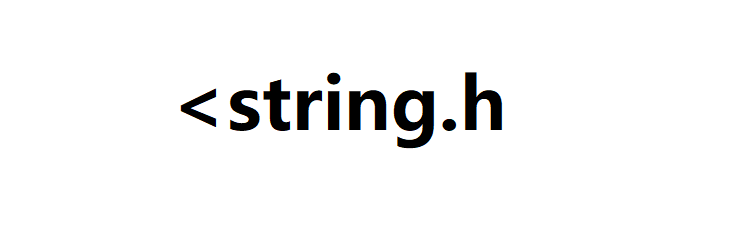C语言实例_string.h库函数功能及其用法详解
一、前言
在计算机编程中,字符串处理是一项常见而重要的任务。C语言的string.h头文件提供了一系列函数和工具,用于对字符串进行操作和处理。这些函数包括字符串复制、连接、比较、查找等功能,为开发人员提供了强大的字符串处理能力。本文将对string.h头文件中的所有函数进行全面介绍,包括它们的功能和使用方法,以帮助大家更好地理解和利用该头文件。
二、函数介绍
下面是对每个函数的详细介绍及其功能。
【1】strlen(const char *str)
- 功能:计算字符串的长度,即字符串中字符的个数,不包括字符串结束符’\0’。
- 返回值:无符号整数,表示字符串的长度。
【2】strcpy(char *dest, const char *src)
- 功能:将源字符串复制到目标字符串中,包括字符串结束符’\0’。
- 返回值:指向目标字符串的指针。
【3】strncpy(char *dest, const char *src, size_t n)
- 功能:将源字符串的前n个字符复制到目标字符串中,包括字符串结束符’\0’。如果源字符串长度不足n,则在目标字符串末尾填充’\0’。
- 返回值:指向目标字符串的指针。
【4】strcat(char *dest, const char *src)
- 功能:将源字符串连接到目标字符串的末尾,包括字符串结束符’\0’。
- 返回值:指向目标字符串的指针。
【5】strncat(char *dest, const char *src, size_t n)
- 功能:将源字符串的前n个字符连接到目标字符串的末尾,包括字符串结束符’\0’。如果源字符串长度不足n,则在目标字符串末尾填充’\0’。
- 返回值:指向目标字符串的指针。
【6】strcmp(const char *str1, const char *str2)
- 功能:比较两个字符串的大小关系。
- 返回值:整数值,当str1小于str2时返回负数,当str1等于str2时返回0,当str1大于str2时返回正数。
【7】strncmp(const char *str1, const char *str2, size_t n)
- 功能:比较两个字符串的前n个字符的大小关系。
- 返回值:整数值,当str1小于str2时返回负数,当str1等于str2时返回0,当str1大于str2时返回正数。
【8】strchr(const char *str, int c)
- 功能:在字符串中查找第一次出现指定字符c的位置。
- 返回值:指向第一次出现指定字符的指针,如果未找到则返回NULL。
【9】strrchr(const char *str, int c)
- 功能:在字符串中查找最后一次出现指定字符c的位置。
- 返回值:指向最后一次出现指定字符的指针,如果未找到则返回NULL。
【10】strstr(const char *haystack, const char *needle)
- 功能:在字符串haystack中查找第一次出现子字符串needle的位置。
- 返回值:指向第一次出现子字符串的指针,如果未找到则返回NULL。
【11】strtok(char *str, const char *delim)
- 功能:将字符串分割为一系列子字符串,使用delim中的字符作为分隔符。
- 返回值:指向分割得到的子字符串的指针,如果字符串已经被完全分割,则返回NULL。
【12】memset(void *ptr, int value, size_t num)
- 功能:将指定的内存块(由ptr指向)的前num个字节都设置为特定值value。
- 返回值:指向内存块的指针。
【13】memcpy(void *dest, const void *src, size_t num)
- 功能:将源内存块(由src指向)的前num个字节复制到目标内存块(由dest指向)中。
- 返回值:指向目标内存块的指针。
【14】memmove(void *dest, const void *src, size_t num)
- 功能:将源内存块(由src指向)的前num个字节复制到目标内存块(由dest指向)中,可以处理内存块的重叠。
- 返回值:指向目标内存由于回答的字符数限制,无法一次性提供完整的函数介绍。以下是续写部分:
【15】memcmp(const void *ptr1, const void *ptr2, size_t num)
- 功能:比较两个内存块的前num个字节的大小关系。
- 返回值:整数值,当ptr1小于ptr2时返回负数,当ptr1等于ptr2时返回0,当ptr1大于ptr2时返回正数。
【16】memchr(const void *ptr, int value, size_t num)
- 功能:在内存块中查找第一次出现指定值value的位置。
- 返回值:指向第一次出现指定值的指针,如果未找到则返回NULL。
【17】memmove_s(void *dest, rsize_t destsz, const void *src, rsize_t count)
- 功能:将源内存块(由src指向)的前count个字节复制到目标内存块(由dest指向)中,可以处理内存块的重叠。确保目标内存块的大小为destsz。
- 返回值:错误码,0表示成功,非零值表示失败。
三、代码示例
以下是对每个函数的用法示例:
【1】strlen(const char *str):
#include 【2】strcpy(char *dest, const char *src):
#include 【3】strncpy(char *dest, const char *src, size_t n):
#include 【4】strcat(char *dest, const char *src):
#include 【5】strncat(char *dest, const char *src, size_t n):
#include 【6】strcmp(const char *str1, const char *str2):
#include 【7】strncmp(const char *str1, const char *str2, size_t n):
#include 【8】strchr(const char *str, int c):
#include 【9】strrchr(const char *str, int c):
#include 【10】strstr(const char *haystack, const char *needle):
#include 